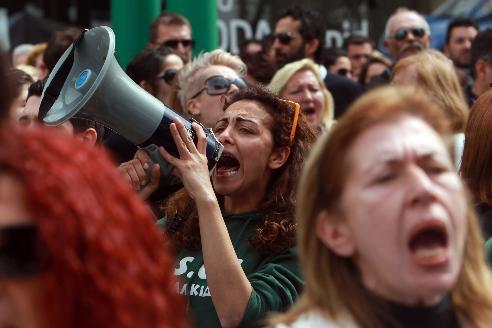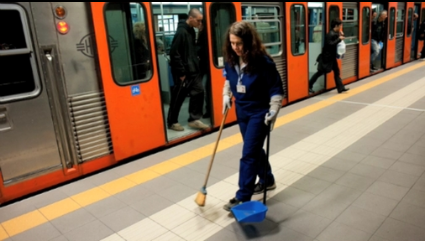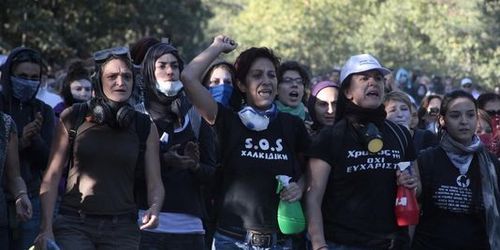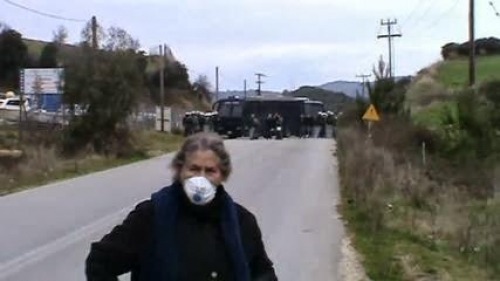 Residents of Chalkidiki in Northern Greece demonstrate against planned construction of a goldmine by Canadian company Eldorado Gold. – Photo by Nikolas Giakoumidis
Residents of Chalkidiki in Northern Greece demonstrate against planned construction of a goldmine by Canadian company Eldorado Gold. – Photo by Nikolas Giakoumidis
Media Representation and Greek Women in Crisis: Four Stories from the Front Lines
By Maria Zepatou
We’ve all heard it. Greece is deep in crisis. But the crisis does not affect everyone equally. A rich 1% has found an opportunity to get even richer by giving starvation wages and violating every labor right there is. But those who get poorer don’t get poorer equally either. Women are affected more than men, especially women of color, immigrant women and trans* women. The further you stand on these concentric circles of which the center are white, cis, upper class men, the less you get paid, and the more likely you are to work uninsured, get threatened or abused in your workplace.
According to Eurostat, while 25% of Greek men are unemployed, the percentage for women reaches 31.1%. The Global Gender Gap Report also reported that in 2013, Greek women’s estimated earned income was 17,071 PPP US$ for women, compared to a 32,467 for men. Overall, Greece ranked 81st out of 136 countries in the Gender Gap Index. One in three women has been the victim of a beating, says the General Secretary of Equality, Vaso Kollia, and incidents of violence against women have increased 47% this year.
But who are the women behind the statistics? Let’s take a look at a few women that caught the media’s attention, and how they were depicted by them. No women of color in this list. Apparently, as far as the mainstream media are concerned, they are invisible.
[Trigger Warning: description of violence]
“What happens to non-submissive bodies”

Konstantina Kuneva, 49 years old, is a cleaner and trade unionist. She migrated from Bulgaria to Greece due to her son’s heart condition. Although she had studied art history, she started working for Oikomet, a company providing cleaning services, and worked in train stations. Eventually, her employers demanded that she and her colleagues sign incomplete forms, which were later presented as new contracts with reduced working hours. The actual hours of work hadn’t of course changed at all. Kuneva decided to organize in her trade union and as result faced numerous threats by her employers and was harassed over the phone. As a single mother, she asked to be moved from a night shift to a morning shift and a location closer to her home. Each and every time, she was denied.
In December 2008, a period when the economic crisis had ominously started to be perceived, she was attacked by two unknown men at the end of her shift, at midnight. They threw vitriol at her and made her drink it. As a result, she was hospitalized and comatosed with many of her internal organs severely damaged. She lost an eye and her esophagus is so wrecked that even today she has difficulties breathing and can only sleep sitting up. Oikomet was found guilty by Greek courts in July 2013 and Kuneva was granted 250,000 euros in compensation.
Newspapers briefly mentioned the court’s decision, as they had briefly mentioned the assault, and the story barely made it to TV. Kuneva was depicted as a heroine that had little to do with the real world or other immigrants: the courageous and hard-working single mother that dares to speak up and fight alone. The media saw her as the exception, and not a real woman in very real circumstances shared by millions of people. Her choice to fight was not depicted as the logical step an oppressed person would take, but rather as an extraordinary act of extra-bravery. And the message was subtle, yet clear: what happened to her body – which some journalists even described as “worse than murder” – is what happens to rebellious or non-submissive bodies (see here a very interesting study in Greek.) Her story was one told only to inspire fear.
“Virgin Mary” mothers
It wasn’t long after the murder of anti-fascist rapper Pavlos Fyssas by a member of neo-Nazi party Golden Dawn and the arrest of several of its members, that social media started referring to him as a hero whose “sacrifice” forced the authorities to investigate the neo-Nazi group. Even Stavros Theodorakis, the noted reporter who interviewed Pavlos Fyssas’ mother, wrote in an article “I bow. To their (Pavlos Fyssas’ parents’) pain and to their offering.”
Magda Fyssa, Pavlos’ mother, usually referred to by the media as “the tragic mother” and no name, has a different opinion: “Ι only want my child back, I am no ancient Spartan”, she said, referring to the tradition that wants Spartan mothers to have proudly sent off their sons to war saying “Either come back with your shield or on it.” And she continues “No one asked me if I wanted to sacrifice my child.”
Presenting a racist murder as something voluntary, as a “sacrifice,” a “deed of heroism” or an “offering,” implies that Pavlos Fyssas on some level chose to be murdered – and he did so by singing anti-fascist songs and organizing. The conclusion that comes out of this is again: “here is what happens to bodies that do not conform.” But the untactful enough reminder that the victim’s mother should be “proud” – of all things – serves another purpose too: murdered people’s parents often speak up and demand justice. The parents of a deceased hero should suffer their grief silently. Government assemblyman Giorgos Kalantzis even said it out aloud: “His family should stop talking. Pain is wordless,” he stated in a radio interview, and, when prompted by the reporter, added: “Pain is wordless. When a mother is in pain she only cries…nothing else.”
Making a self-sacrificing Jesus out of Fyssas’ dead body seems therefore to serve in an attempt to make a Virgin Mary out of his mother: a selfless, all-enduring woman that sits by the cross and suffers silently.
Threatening and non-threatening female bodies

In Chalkidiki, Northern Greece, Eldorado Gold has began constructing a mine in the area of the ancient forest of Skouries. The residents, whose income mostly comes from tourism, have been strongly opposed to the mine for over a year, facing police brutality for which even Amnesty International issued a public statement, exposing the human rights violations. In this movement, women have played an indispensable role from the very beginning. When a protest or march is on, they organize groups that cook and babysit for everyone else. These women, living next to the “Holy Mountain” Athos, an autonomous peninsula of 129 square miles where no female is allowed to enter and disturb the peace of the monks in residence, have challenged patriarchy quite strongly. The media representation of them? Non-existent. The inhabitants of the area are often depicted as “terrorists” and admitting this is a women-led movement would probably make it seem less threatening: women are usually perceived as victims and not the other way around.

Still, three women demonstrators were found guilty and sentenced to a suspended six to seven months in prison for civil disobedience. They denied the charges as fabricated. Α 76-year old was also invited to testify as a suspect. Soon, the Internet was full of articles commenting the arrest of the “heroic granny,” as everyone seemed to call her. The justified outrage over what was essentially the lawful bullying of an elderly woman by the state was tangled with sarcasm over “how dangerous a 76-year old woman could possibly be” or if “next thing you know they’ll arrest babies.” Note how her elderly female body was not only dismissed as incapable of civil disobedience, but also compared to that of a baby, a not-yet-self-conscious human being.
In 2013, 33.7% of Greek people couldn’t cover at least 3 out of 9 basic human needs. Their bodies are directly threatened by the European Union’s austerity policies. But it seems that female bodies have a double war to fight: they are targeted, and at the same time ignored and dismissed. When inevitably they speak up about the effects the crisis – economic and humanitarian – has on them, they are reminded that their place is not in the public sphere, and they are subtly but eloquently told that they should remain private, and hidden.
One thing is for sure: much is at stake when we’re talking about half a country’s population – and the mainstream media, functioning as what Althusser would describe as an ideological mechanism of the state, seem perfectly aware of that.

